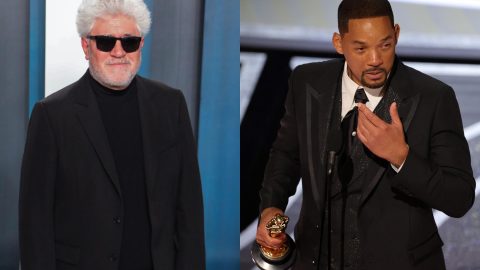
Released 35 years ago this week, coming-of-age drama Crossroads was a vehicle for rising star Ralph Macchio, then basking in the success of The Karate Kid. He plays Eugene ‘Lightning Boy’ Martone, a wannabe blues virtuoso studying classical guitar at New York’s Juilliard School. Eugene is obsessed with tracking down an unrecorded song by Robert Johnson, the legendary Mississippi Delta bluesman who, legend has it, sold his soul to Satan and ended up a member of ‘The 27 Club’. In his bid to find the fabled lost tune, Eugene enlists the help of a grumpy old-timer and former friend of Johnson’s, Willie Brown, aka Blind Dog Fulton (Joe Seneca).
A cheerful slice-of-life tale told with a Southern gothic charm, Crossroads – referencing Johnson’s most famous composition, 1936 track ‘Cross Road Blues’ – was written by John Fusco (Hidalgo, The Highwaymen) and directed by Walter Hill (The Warriors). It performed poorly at the box office because the audience – and most critics – dismissed it as an attempt to ride the coattails of Macchio’s recent karate-chopping blockbuster.

From his base in Los Angeles, Hill, an affable fellow, granted NME a rare audience via Zoom, to reminisce about a work that is generally forgotten even among fans of the action auteur (though blues aficionados have long sworn by it). “This picture never really got much attention [at the time] and I can’t tell you many people have asked me about it,” is how he bluntly puts it.
While it’s true Crossroads was intended by Hill to deliver something a bit more teen-friendly than his usual output, the film readily connects to his recurring interest in the intersection between American history and mythology. Sure, The Karate Kid didn’t do his movie any favours, but the director recognised the superficial similarities right from the start, so did Macchio, who Hill calls a terrific and dedicated actor. “There’s a mentor relationship, with a minority mentor, plus Ralph’s persona.” Yet 35 years on, Hill isn’t particularly haunted by its failure. “[The Karate Kid] sank perceptions, which is too bad, but what the hell, life’s tricky. Do your best and move on.”

Crossroads turned out to be a more personal than usual undertaking, for Hill. In the amusingly grouchy yet increasingly loving relationship between Eugene and Willie, he saw himself and his father. “It was clear he was going to be moving on to the next world, and I was very close to my father. He was the one who really introduced me to music. I never played an instrument, but my father was a percussionist for local bands, and he was a jazz guy. He tried to educate me. I think I did the movie partially, certainly I know I did it partially, because it reminded me a lot of the relationship with my father.” Such heartfelt reasoning rejects any Karate Kid rip-off accusations – the work is far more than a cynical cash-in.
One aspect that he did question surrounds what today we call cultural appropriation. Though back then there was no term for it, Hill was sensitive to the topic. “I said [to the producers], I wasn’t sure about trying to regain the culture of the blues [with a white kid in the lead]. ‘Shouldn’t you guys be talking to a young Black actor?’ I said. But [the producers reasoned] Ralph was hot [as a property] and all that. I now think, although my original impulse sounds like virtue-signalling, in retelling this story, I think it’s better that I didn’t get that deeply into a core Black experience, because I would have been way over my head. If nothing else, it’s a hymn to the blues.”
Direct evidence of this sensitivity can be found in a line, heard early on, not long after Eugene and Willie meet, where the old man dismisses the kid’s professed love for the blues as, ‘You’re just one more white boy ripping off our music.’ Hill can’t remember if he came up with the mocking line or it was in the original script: “It certainly sounds like me, but if I didn’t and John wrote it, I certainly approved of it.”
Hill’s Faustian saga climaxes in a space between realms. Eugene, armed with a pawn shop-purchased Fender Telecaster, butts heads with Jack Butler (Steve Vai). In this crucible of the damned, supreme 1980s rock pomp dukes it out with graceful, soulful playing. The guitar virtuoso bagged the role as the Devil’s axe man thanks to Ry Cooder, who composed the film’s gorgeous score and the foot-stomping ‘Willie Brown Blues’, performed in the ace ‘jook joint’ scene. Fusco has, in the past, mentioned how Jimmy Page was considered, and Keith Richards too, but that’s news to Hill. “First I’ve heard of it,” he says. “[Vai] was brought to my attention by Ry. Ry was too shy to do it himself and he didn’t think that [shredding] was his greatest strength as a guitarist.”
A fascinating reimagining of an Old West shootout, with six-string guitars instead of six-shooters, this inspired take on the classic showdown at high noon replaces exchanges of gunfire with jaw-dropping fretboard shredding. It’s among the most febrile, unique and technically challenging sequences Hill has ever mounted, and the filmmaker remains proud of it to this day. “The atmospherics in that scene are actually insane,” he muses. “It’s a mythopoetic church in the middle of nowhere, populated by the dead, the dying, those trying to hang on, those who believe and those who don’t believe.” The big challenge for Hill was to craft a tale that “starts out at a realistic level and then on the journey, you get to this insane supernatural place.”
With Ralph Macchio currently enjoying a career revival, thanks to Netflix hit Cobra Kai, it’s about time this “hymn to the blues” got the praise it rightly deserved 35 years ago.
The post ‘Crossroads’ at 35: why Walter Hill’s lost blues drama deserves an encore appeared first on NME.








